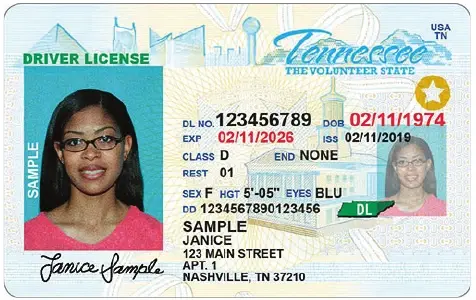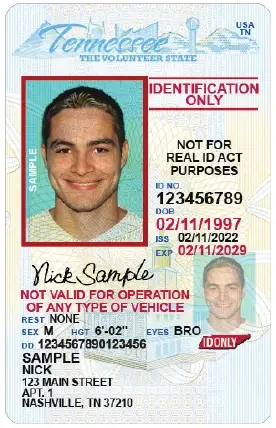Home » Driver’s license » Get a license
How to Get a Driver’s License
Table of Contents
Motorcycle license
CDL license
If you’ve recently moved to the Volunteer State or are a first-time driver ready to hit the open road, you may wonder how to obtain your Tennessee driver’s license.
This comprehensive guide will cover everything you need to know about the process of acquiring a Tennessee drivers license, whether you’re a novice or returning applicant.


First Time and Returning Applicants
First-time applicants refer to individuals who have never held a valid driver’s license in any state, including Tennessee. They might be teenagers who have just reached driving age, or adults who have never before operated a motor vehicle. Returning applicants include individuals who have a valid driver’s license obtained in the past but let it expire for more than five years.
To get your Tennessee driver’s license, you’ll need to follow these steps:
Visit a Local Driver Services Center
The nearest location is on the Tennessee Department of Safety and Homeland Security website. You can also make an appointment online or by phone to avoid long wait times.
Complete an Application Form for a New Tennessee Driver License
You can download the form from the website or get one at the driver services center. You must fill out your personal information, such as name, address, date of birth, social security number, and organ donor status.
Provide Proof of Identity Tennessee Residency, and u.s. Citizenship or Lawful Presence in the u.s
You will need to present original or certified copies of documents that verify your identity and legal status.
For example, you can use a U.S. passport, a birth certificate, a permanent resident card, or a foreign passport with a visa and I-94 form. You will also need to show two proofs of being a Tennessee resident, such as a utility bill, a bank statement, a lease agreement, or a voter registration card.
Pass the Necessary Tests
Vision, knowledge, and road skills: You must take a vision test to ensure you can see enough to drive safely. You will also need to take a knowledge test comprising 30 multiple-choice questions about the rules of the road, traffic signs, and safe driving practices. You must score at least 80% to pass the test. You can prepare for the test by studying the Tennessee Comprehensive Driver License Manual or taking online practice tests.
If you pass the knowledge test, you will receive a learner permit to practice driving with a licensed adult in the front seat. After holding the permit for at least 180 days (or 90 days if you are over 18), you can take the road skills test that evaluates your ability to perform basic maneuvers such as turning, parking, backing up, and changing lanes.
Pay the Required Licensing Fees
The fee for a regular Class D driver’s license is $28 for five years or $55 for eight years. You can pay by cash, check, money order, or credit card at the driver services center.
If you have never received a driver’s license, you must also take the new drivers awareness course. This class covers various topics, including Tennessee’s traffic laws, highway signs and signals, and the consequences of traffic violations. For returning applicants, if your license has been expired for more than five years, you may be required to complete a refresher course before you can apply for a new driver license.
Let’s break down each of these steps:
1. Vision Test
All drivers are required to meet certain vision standards to ensure safe operation of a motor vehicle. The minimum requirement in Tennessee is 20/40 vision in at least one eye. If you wear glasses or contact lenses, you can use them during the test.
2. Knowledge Test
The knowledge test evaluates your understanding of Tennessee motor vehicle laws and safe driving practices. It’s a written test, but some driver service centers may offer a computer version. The test consists of multiple-choice questions based on the information contained in the Tennessee Comprehensive Driver License Manual.
3. Road Skills Test
The road skills test assesses your ability to operate a motor vehicle and observe traffic laws safely. To take the road skills test, you must provide a vehicle in good working condition and proof of insurance. The vehicle will be inspected before the test. During the test, you’ll be evaluated on various aspects including your ability to control the vehicle, observe traffic signs and signals, and interact safely with other road users.
It’s essential to practice and prepare thoroughly for this test, as failing could result in a mandatory waiting period before you can retake it. The specific skills you’ll be evaluated on include parallel parking, changing lanes, navigating intersections, and safely approaching and leaving the curb.
By passing these tests, you demonstrate that you’re ready to become a licensed driver in Tennessee. You’ll be issued an intermediate restricted driver’s license if you’re a teenager, or a Class D license if you’re an adult, marking your journey into the driving world.
Graduated Driver’s License Program
The Graduated Driver License Program is specifically designed for teenagers and young drivers in Tennessee. The program has three phases – Learner Permit, Intermediate Restricted License, and Intermediate Unrestricted License. This step-by-step process ensures that young drivers gain the necessary experience and knowledge in a controlled and phased manner before they receive an intermediate unrestricted driver’s license.
- Learner Permit: This is the first step for teenagers aged 15-17. The young driver must pass the vision and knowledge tests and have a legal guardian or parent sign the application form.
- Intermediate Restricted License: Once the driver is 16 and has held a learner’s permit for at least 180 days, they can apply for this license. The driver must pass a road skills test and should not have any traffic violations at the time of application.
- Intermediate Unrestricted License: The driver can apply for this license at age 17, provided they’ve held an Intermediate Restricted License for at least one year without any traffic violations. The teen driver will automatically upgrade to a Class D License when they turn 18.
During each phase, drivers must obey specific restrictions, like no driving between certain hours and no passengers outside of family for a certain period. Violations of these restrictions can lead to penalties, including license suspension and mandatory driver education classes.
Reinstatement of a Driver’s License
The reinstatement of a driver’s license in Tennessee is necessary for individuals whose licenses have been suspended or revoked. The reasons for this could be various traffic violations, driving under the influence (DUI), or failing to comply with court obligations. To have a driver’s license reinstated, you must:
- Visit a Driver Services Center or check online for your eligibility.
- Pay all the required fees.
- Provide the necessary documents.
- Complete any required courses or treatments, if applicable.
These requirements may vary depending on the reason for your license suspension or revocation. For instance, if your license was suspended due to a DUI, you may also need to provide proof of completion of a state-approved DUI program and potentially install an ignition interlock device in your vehicle.
Requirements for Out-of-State Drivers
If you hold a valid driver’s license from another state and move to Tennessee, you must convert your out-of-state license to a new Tennessee driver’s license. The process involves surrendering your out-of-state license, passing a vision test, and providing the required documentation for proof of identity, residency, and legal presence.
Remember that you’ll need to convert your license within 30 days of establishing your residency in Tennessee. Failing to do so may result in fines and penalties.
Required Documents
Applying for a new Tennessee driver’s license requires you to present several key documents to verify your identity, residency, and legal status in the United States.
Identification
You must provide proof of identity, such as a certified U.S. birth certificate, a valid U.S. passport, a certificate of citizenship, or a foreign passport with a valid U.S. visa.
Proof of Residency
To prove your Tennessee residency, you can provide documents such as a current utility bill, bank statement, or rental/mortgage agreement that shows your full name and residential address.
Proof of Legal Presence
Applicants must show proof of U.S. citizenship or lawful presence in the U.S., such as a U.S. birth certificate, U.S. passport, or permanent resident card.
Always check the official Tennessee Department of Safety & Homeland Security website for accurate and current information.
It’s a good idea to bring additional forms of identification, proof of residency, and legal presence, in case one of your documents is not accepted or if additional verification is required.
Is a Tennessee Driver’s License Required?
If you’re living in Tennessee and operating a motor vehicle, the short answer is yes, you do require a Tennessee drivers license. This applies to everyone, irrespective of whether they drive regularly or occasionally. If you have moved from a different state or country, you must also obtain a new driver’s license.
Holders of foreign licenses or an International Driving Permit (IDP) can use their licenses for a short period, usually up to 30 days, after they arrive in the state. After that, you will be expected to apply for a Tennessee driver’s license to operate a motor vehicle legally.
It’s also important to note that driving without a valid license can lead to serious penalties, including fines, jail time, and a delay in obtaining a license.
What Are the Deadlines For Getting a Driver’s License?
Deadlines for getting a Tennessee driver’s license can vary depending on the individual’s situation. New residents to the state are required to obtain a driver’s license within 30 days of establishing their residency.
There is no specific deadline for first-time applicants under 18 to apply for a license. Still, they must hold a learner’s permit for at least 180 days before applying for an intermediate restricted driver’s license.
Returning residents whose previous Tennessee driver’s license has been expired for more than five years will be required to retake both the knowledge and road skills tests.
Remember, delaying the process could result in additional complications, including retaking tests, further documentation requirements, and potential fines for not converting an out-of-state license promptly.
Final Thoughts
Obtaining a Tennessee drivers license involves several steps, whether you’re a first-time applicant, a returning resident, or a new resident transitioning from an out-of-state license. Understanding the requirements and processes to ensure a smooth transition to being a licensed in the state is critical.
Navigating the journey to become a licensed driver in Tennessee can be straightforward when you understand what to expect. With this knowledge, you’ll be well on your way to obtaining your Tennessee driver’s license and enjoying the open road.
